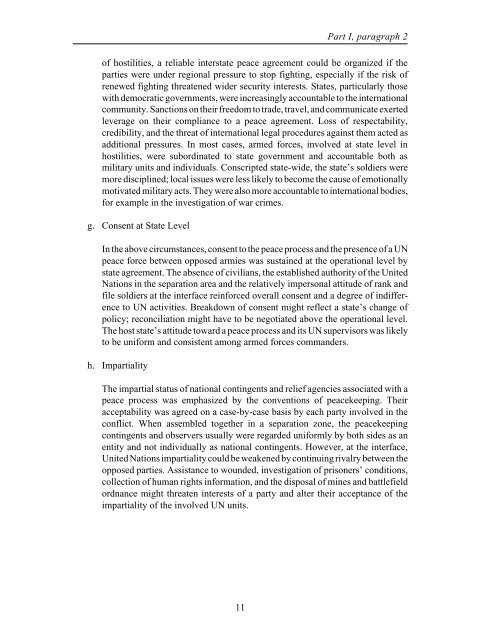a guide to peace support operations - The Watson Institute for ...
a guide to peace support operations - The Watson Institute for ...
a guide to peace support operations - The Watson Institute for ...
You also want an ePaper? Increase the reach of your titles
YUMPU automatically turns print PDFs into web optimized ePapers that Google loves.
of hostilities, a reliable interstate <strong>peace</strong> agreement could be organized if the<br />
parties were under regional pressure <strong>to</strong> s<strong>to</strong>p fighting, especially if the risk of<br />
renewed fighting threatened wider security interests. States, particularly those<br />
with democratic governments, were increasingly accountable <strong>to</strong> the international<br />
community. Sanctions on their freedom <strong>to</strong> trade, travel, and communicate exerted<br />
leverage on their compliance <strong>to</strong> a <strong>peace</strong> agreement. Loss of respectability,<br />
credibility, and the threat of international legal procedures against them acted as<br />
additional pressures. In most cases, armed <strong>for</strong>ces, involved at state level in<br />
hostilities, were subordinated <strong>to</strong> state government and accountable both as<br />
military units and individuals. Conscripted state-wide, the state’s soldiers were<br />
more disciplined; local issues were less likely <strong>to</strong> become the cause of emotionally<br />
motivated military acts. <strong>The</strong>y were also more accountable <strong>to</strong> international bodies,<br />
<strong>for</strong> example in the investigation of war crimes.<br />
g. Consent at State Level<br />
In the above circumstances, consent <strong>to</strong> the <strong>peace</strong> process and the presence of a UN<br />
<strong>peace</strong> <strong>for</strong>ce between opposed armies was sustained at the operational level by<br />
state agreement. <strong>The</strong> absence of civilians, the established authority of the United<br />
Nations in the separation area and the relatively impersonal attitude of rank and<br />
file soldiers at the interface rein<strong>for</strong>ced overall consent and a degree of indifference<br />
<strong>to</strong> UN activities. Breakdown of consent might reflect a state’s change of<br />
policy; reconciliation might have <strong>to</strong> be negotiated above the operational level.<br />
<strong>The</strong> host state’s attitude <strong>to</strong>ward a <strong>peace</strong> process and its UN supervisors was likely<br />
<strong>to</strong> be uni<strong>for</strong>m and consistent among armed <strong>for</strong>ces commanders.<br />
h. Impartiality<br />
Part I, paragraph 2<br />
<strong>The</strong> impartial status of national contingents and relief agencies associated with a<br />
<strong>peace</strong> process was emphasized by the conventions of <strong>peace</strong>keeping. <strong>The</strong>ir<br />
acceptability was agreed on a case-by-case basis by each party involved in the<br />
conflict. When assembled <strong>to</strong>gether in a separation zone, the <strong>peace</strong>keeping<br />
contingents and observers usually were regarded uni<strong>for</strong>mly by both sides as an<br />
entity and not individually as national contingents. However, at the interface,<br />
United Nations impartiality could be weakened by continuing rivalry between the<br />
opposed parties. Assistance <strong>to</strong> wounded, investigation of prisoners’ conditions,<br />
collection of human rights in<strong>for</strong>mation, and the disposal of mines and battlefield<br />
ordnance might threaten interests of a party and alter their acceptance of the<br />
impartiality of the involved UN units.<br />
11

















